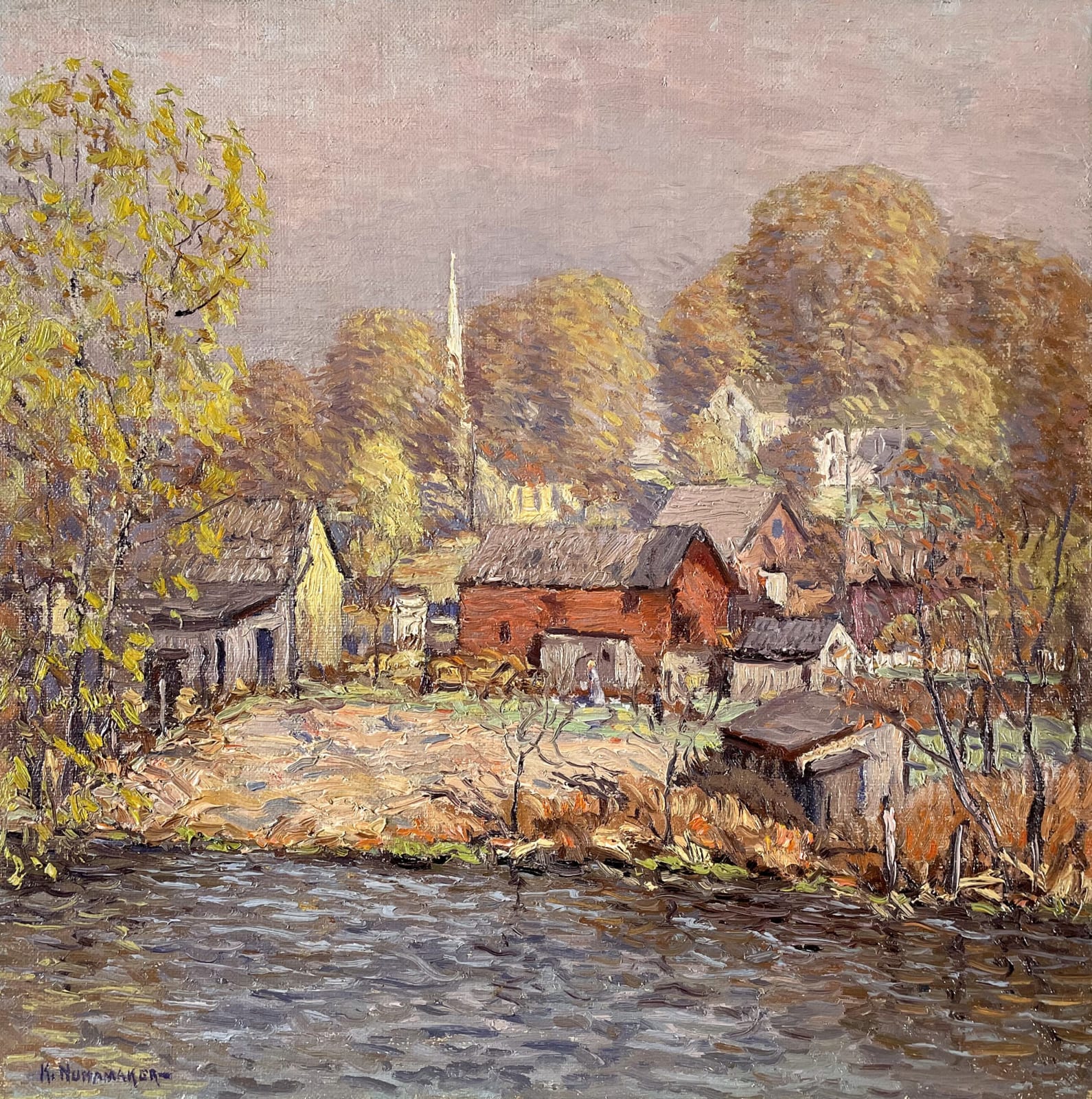Kenneth Nunamaker 1890-1957
Early View of Stockton, New Jersey, 1930
Oil on board
13 1/2 x 13 3/4 inches (34.3 x 34.9 cm)
Framed dimensions: 17 x 17 1/8
Framed dimensions: 17 x 17 1/8
Signed lower left: K. Nunamaker
Kenneth Nunamaker never took a formal art lesson. His “training” began during his travels out West as a young man, where he painted in his spare time. It continued informally...
Kenneth Nunamaker never took a formal art lesson. His “training” began during his travels out West as a young man, where he painted in his spare time. It continued informally throughout his career in commercial art, as he took sketching and painting excursions in the countryside. He said he acquired “the rudiments of design, form, color, and composition in the hard schools of commercial art studios.” But despite this experience the artist’s strongest artistic foundations came from a direct observation of nature. He often spoke of translating the landscape around him into shapes on the canvas.
Nunamaker moved to Philadelphia and not long after bought a home along the Delaware River at Center Bridge. There he met Edward Redfield, a guiding force behind the New Hope School of painting. Redfield mentored Nunamaker, meeting with him weekly and reviewing his work. Nunamaker also befriended Daniel Garber and several other artists affiliated with the New Hope School, and soon became a prominent member of the artists' community. Among this group and to most of the people who knew him Nunamaker was beloved.
In Early View of Stockton, New Jersey the artist’s direct observation of nature is apparent in his mastery of light and shadow. The way he translates the shapes of nature onto the canvas creates a composition that is at once balanced and fluid. He builds the landscape with color and masterfully creates depth with little detail. This painting also captures the magic of a familiar place. Important to the New Hope School was the desire to paint the bucolic landscape of Bucks County in a way that spoke to the artist’s intimate knowledge of the area. Nunamaker’s active engagement with the landscape is revealed not only in his choice of subject matter but also in the way he painted it. By taking a familiar scene and painting it with freshness and vitality, Nunamaker’s Early View of Stockton, New Jersey stands as a fine example of his mastery of the medium and the importance of New Hope School at large.
Nunamaker moved to Philadelphia and not long after bought a home along the Delaware River at Center Bridge. There he met Edward Redfield, a guiding force behind the New Hope School of painting. Redfield mentored Nunamaker, meeting with him weekly and reviewing his work. Nunamaker also befriended Daniel Garber and several other artists affiliated with the New Hope School, and soon became a prominent member of the artists' community. Among this group and to most of the people who knew him Nunamaker was beloved.
In Early View of Stockton, New Jersey the artist’s direct observation of nature is apparent in his mastery of light and shadow. The way he translates the shapes of nature onto the canvas creates a composition that is at once balanced and fluid. He builds the landscape with color and masterfully creates depth with little detail. This painting also captures the magic of a familiar place. Important to the New Hope School was the desire to paint the bucolic landscape of Bucks County in a way that spoke to the artist’s intimate knowledge of the area. Nunamaker’s active engagement with the landscape is revealed not only in his choice of subject matter but also in the way he painted it. By taking a familiar scene and painting it with freshness and vitality, Nunamaker’s Early View of Stockton, New Jersey stands as a fine example of his mastery of the medium and the importance of New Hope School at large.
Provenance
The artist;Gift from the artist to his friend, Austin M. Wortley, Drexel Hill, Philadelphia;
By descent in the family to Joseph G. Wortley, until 2023;
Private collection, Pennsylvania, 2024
Please join our mailing list
* denotes required fields
We will process the personal data you have supplied in accordance with our privacy policy (available on request). You can unsubscribe or change your preferences at any time by clicking the link in our emails.



